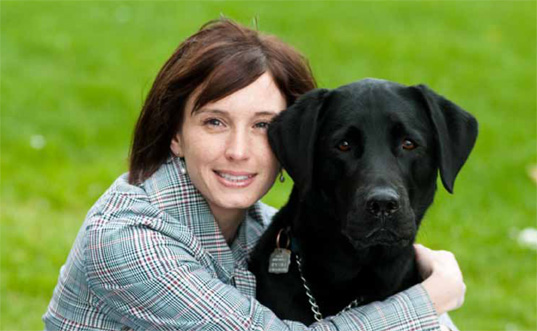By Evra Taylor
 Three words – optic nerve glioma – don’t exactly roll off your tongue but it’s a condition Tamara Tedesco has lived with since infancy. Vancouver-born Tedesco was diagnosed with the condition at 18 months when her parents received what she calls a quick “spot-on” diagnosis.
Three words – optic nerve glioma – don’t exactly roll off your tongue but it’s a condition Tamara Tedesco has lived with since infancy. Vancouver-born Tedesco was diagnosed with the condition at 18 months when her parents received what she calls a quick “spot-on” diagnosis.
Optic nerve glioma is an uncommon condition involving tumours that press on the optic nerve, causing blindness. In Tedesco’s case, there is a benign tumour on the optic nerve of each eye. She underwent 18 months of chemotherapy to shrink the tumours, an experience she “sailed through,” considering the trauma of both the disability and the treatment.
Now 26, Tedesco describes the treatment experience in a way that reflects her positive attitude. “People ask if it was difficult to go through. Actually, it wasn’t. I have no bad memories, apart from feeling nauseous much of the time I was on chemotherapy. My parents definitely had a harder time with it than I did.”
As often occurs with childhood illness, Tedesco thought her condition was just part of life because it was all she knew. “Being so young, I thought my reality was normal and that every kid had to do the things I did.” In one instance, her lack of sight proved a blessing. “When my hair started falling out, I couldn’t see that other peoples’ hair wasn’t falling out, too,” she said.
Tedesco now has roughly eight per cent vision in her right eye and light perception in her left. Her peripheral vision is completely gone, resulting in tunnel vision. Tedesco uses the word “lucky” to describe the fact that her condition is stable. She undergoes an MRI every two years, each of which has shown that the tumours are shrinking slightly.
Overall, Tedesco’s life experience has been positive. She attended mainstream schools and began learning Braille around age four. She enjoyed school and had no trouble making friends. “I wasn’t shy. There was fear, curiosity and awkwardness on the part of other kids but I was a bit of a novelty and learned how to use my differences to advantage.”
Tedesco attended the British Columbia Institute of Technology (BCIT), graduating with a certificate in marketing and communications in 2010. She currently works as a communications coordinator, handling public relations, media relations and community outreach for the British Columbia and Yukon office of CNIB in Vancouver.
“This is exactly what I wanted to do. I really enjoy the fact that the work is different every day,” Tedesco remarked. Her future career plans include continuing to work in areas where her excellent communication skills can be put to use. “I can really get behind the idea of increasing independence for people who are blind or partially sighted”.
The hallmark of Tedesco’s life is her ability to advocate for herself – to look honestly at her needs and seek assistance when necessary. Now, she hopes to help others do the same. “By the time I reached post-secondary school I really knew how to advocate for myself. I took my laptop to class and asked the teachers for assistance. Whatever accommodations I requested were granted”.
In terms of navigating her life, Tedesco relies on the guide dog she has had since age 15. (At the time, she was the second youngest person in North America to have such a dog.) She describes the experience as “life changing”, increasing her independence tremendously. She counts herself fortunate to have parents who were extremely positive role models. “They encouraged me to try things and not to be afraid to take risks.” Tedesco did everything other children did, including climbing trees and riding a bike. Ever the daredevil, she also likes to rock climb and swim – activities she would, “never recommend to other blind people. It’s the way I was raised but it’s not for everybody.”
Tedesco’s self-advocacy takes the form of offering this advice to other blind or partially sighted individuals: don’t let blindness get in your way but be aware of the need to adapt your activities and of the effects blindness will have on your life. “I didn’t realize until just a few years ago that my blindness tires me,” she noted. “I wear out faster than other people so I take a daily 15-minute nap to recharge my batteries.”
As part of her commitment to defend the rights of the disabled and advocate on their behalf, Tedesco is a member of the board of directors of B.C.’s Access for Sight Impaired Consumers (ASIC), an independent, consumer-driven advocacy coalition addressing issues affecting people who are blind, sight impaired or deaf-blind.
“Allowing yourself to accept help is important. People are willing to make things as easy for disabled individuals as they can. It makes them feel good – and they certainly don’t look at you as less of a human being if you ask for help. This is something the blind person has to discover for himself.”







